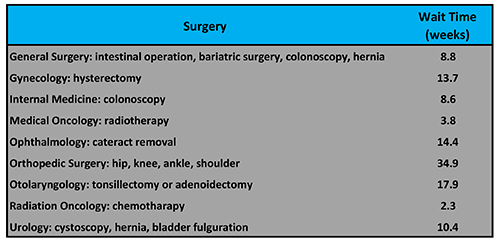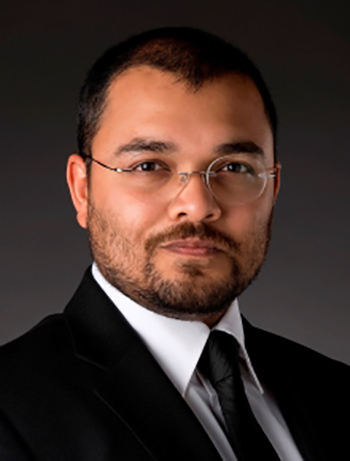Syracuse, New York, aims to position itself as the healthcare destination of choice for Ontarians right across the border who are weary of waiting for free healthcare from their provincial health service
There is a new twist in medical tourism! United States hospitals are advertising to Canadians who are frustrated by increasingly long waiting times for elective medical procedures from their national health service. U.S. providers are hoping to lure them across the border for quicker access to care.
Until recently, U.S. hospitals were not motivated to attract Canadian patients as a way to generate new admissions. However, years of sustained cuts to prices paid to U.S. hospitals by health insurers have made it economically attractive for U.S. hospitals to advertise to Canadian patients just across the border. The medical laboratories of American hospitals serving medical tourists benefit from this source of patients.
Number of Canadians Coming to U.S. for Medical Care Each Year Growing
While Canadians get most of their medical care for free through a nationwide, single-payer system administered by each province, thousands of Canadians come to the U.S. each year seeking medical care. In 2014, an estimated 52,513 Canadians received non-emergency medical treatment outside Canada. The largest number of patients leaving the country for healthcare are from the Province of Ontario and total 26,252, according to the Fraser Institute, a Canadian research organization. The number of Canadians seeking medical care outside the country’s borders was up 26% from a year earlier, the study showed.
University Hill Corp. is a nonprofit in Syracuse, New York, that represents hospitals, academic institutions, and other nonprofits in the Central New York region. It wants to capitalize on that trend and attract medical tourists to local hospitals. According to Syracuse.com the organization is working with Visit Syracuse on a medical tourism project.
“We know there is a demand and it’s a market we can go after,” University Hill Corp. President David Mankiewicz told Syracuse.com.

Ontario consulting firm Electric Strategies identified these specialties as the best prospects for attracting medical tourists to Syracuse from Ontario. They are based on patient wait times in Ontario and the capacity of medical providers in Syracuse. (Caption and data copyright: Syracuse.com.)
Attracting Medical Tourism to Generate New Admissions
Electric Strategies, an Ontario consulting firm hired by University Hill, determined that Syracuse could lure a significant number of Eastern Ontario’s two million medical consumers who are only a 3.5-hour to 4.5-hour drive away. The consultant is now studying how Syracuse can best position itself as a medical destination to Ontarians.
Bacchus Barua, a Senior Economist at the Fraser Institute and author of the “Leaving Canada for Medical Care” study, told The National Post finds that Ontario’s large population only provides part of the answer to why so many residents seek care elsewhere.
“There’s 1.3% of your patients receiving treatments abroad, then you combine that with the total number of procedures that are performed in the province as well. So, it’s not wholly explained just by the fact there are more people in Ontario, but it’s partially explained by that,” Barua said.

Bacchus Barua, Senior Economist at the Fraser Institute in Canada, has authored studies showing waiting times in Canada for elective medical treatments are on the rise, as is the number of Canadians traveling abroad for medical treatment. In 2014, more than 52,000 Canadians sought healthcare outside the country’s borders, with the largest number of patients coming from Ontario. (Photo copyright: The Fraser Institute.)
Syracuse will work to attract more Ontario patients by creating a concierge service for Canadians. This service will provide these Canadians with one-stop shopping when they call to line up a physician, book a hotel room, and arrange transportation.
“We’d like to come up with a complete package and one invoice,” Mankiewicz told Syracuse.com. “The whole idea is to make it easy for people to come down.”
Across Canada, neurosurgeons reported the highest proportion of patients travelling abroad for treatment (2.6%), while plastic surgeons reported the lowest (0.3%). The largest number of patients traveled abroad for internal medicine procedures, according to the Fraser Institute.

University Hill Corp. President David Mankiewicz is leading an effort to attract wait-weary Canadians to the Syracuse, New York, area for medical care by offering a concierge service for Canadians that will provide them with one-stop shopping when calling to line up a physician, book a hotel room, and arrange transportation. “We know there is a demand and it’s a market we can go after,” Mankiewicz said. (Photo copyright: Syracuse.com.)
Wait Times Most Common Motivation for Canadians to Seek Healthcare in U.S.
Medical tourism has gained popularity among Canadians as waiting times for elective procedures and other specialty care has grown. Reducing waiting time for care was the most commonly cited motivation for Canadian involvement in medical tourism, according to an Open Medicine review.
In the Fraser Institute’s 2015 “Waiting Your Turn” report, which Barua also authored, waiting for treatment was called the “defining characteristic of Canadian healthcare.” The survey reported that, on average, a Canadian patient waits 18.3 weeks to receive medical treatment from a specialist after referral from a general practitioner. The more-than-four-month wait is slightly longer than the 18.2-week wait reported in 2014 and 97% longer than in 1993, when the wait time was just 9.3 weeks.
“That a considerable number of Canadians travelled abroad and paid to escape the well-known failings of the Canadian healthcare system speaks volumes about how well the system is working for them,” the Fraser Institute concluded.
Ontario Ministry of Health Inks Agreements with American Hospitals
While increasing numbers of Canadians have private health insurance through their employers that covers care outside of the Canadian system, some provinces also authorize “out-of-country health services.” Health Canada, the government healthcare agency, endorsed in a 1999 feasibility study sending patients to the U.S. for care to reduce waiting times, rather than encouraging Canada’s private sector to pick up the slack, Managed Care Magazine reported.
That has led to the Ontario Ministry of Health entering into agreements with some Detroit hospitals for imaging tests, bariatric, heart, and other services that have long waiting lists in Ontario, CNN reported.
Syracuse would like to pull medical tourism business away from other cities, including locations in Florida, where Canadians vacation in the winter and get medical procedures while there. “They fly over our heads [here in Syracuse] to another market,” Mankiewicz said.
Of course, medical tourism from Canada benefits the U.S. hospital-based clinical laboratories and pathology groups that serve these patients. But the increased interest among Canadians to travel to the United States to get healthcare services they could get in their home provinces (if they waited long enough) raises an important question: why is Canada’s universal healthcare system unable to provide timely access to elective clinical services in the first place?
At a time when the debate about a single-payer healthcare system continues in the United States, policymakers would be well-served to study the issues in Canada and other countries that already have a national health system. Their problems delivering timely access to healthcare services should be understood in order to avoid similar issues from occurring here in the United States as healthcare in this country continues its transformation.
—Andrea Downing Peck
Related Information:
Waiting Your Turn: Wait Times for Health Care in Canada, 2015 Report
Leaving Canada For Medical Care, 2015
Cross-Border Traffic Highlights Differences in U.S., Canadian Systems
Canadians Crossing the Border for U.S. Healthcare?
More than 52,000 Canadians Travelled Abroad for Health Care Last Year, Study Finds
Syracuse Hospitals Want to Lure Canadians Weary of Long Health Care Waits



